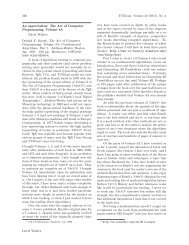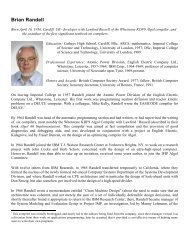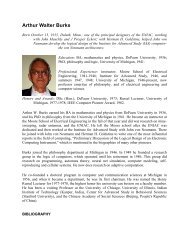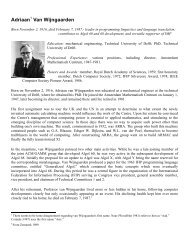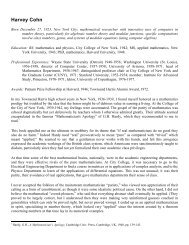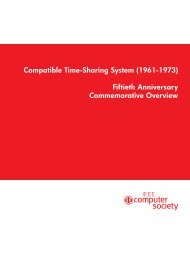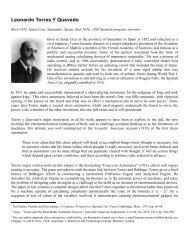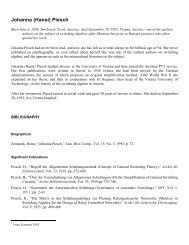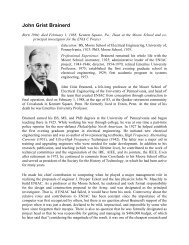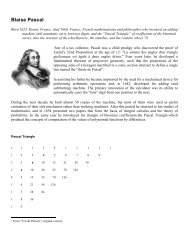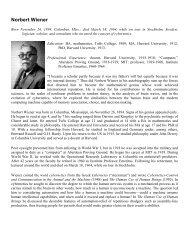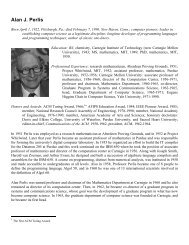Charles Babbage - Walden Family
Charles Babbage - Walden Family
Charles Babbage - Walden Family
Create successful ePaper yourself
Turn your PDF publications into a flip-book with our unique Google optimized e-Paper software.
For the next eight years <strong>Babbage</strong> continued to apply to the government for a decision on whether to continue<br />
the suspended Difference Engine or begin the Analytical Engine, seemingly unaware of the social problems that<br />
preoccupied Britain's leaders during what Macauley called the Hungry Forties. Although £17,000 of public<br />
money had been spent, and a similar amount by <strong>Babbage</strong>, the Prime Minister avoided him. “It is nonsense,”<br />
wrote Sheepshanks, “to talk of consulting a Prime Minister about the kind of Calculating Machine that he<br />
wants.” Prime Minister Robert Peel recommended that <strong>Babbage</strong>'s machine be set to calculate the time at which<br />
it would be of use. “ I would like a little previous consideration,” wrote Peel, “before I move in a thin house of<br />
country gentlemen a large vote for the creation of a wooden man to calculate tables from the formula x2+x+41.”<br />
Finally, in November 1842, the Chancellor of the Exchequer, having sought the opinion of Sir George Airy on<br />
the utility of the machine, and having been told it was “worthless,” said he and Peel regretted the necessity of<br />
abandoning the project. On November 11, <strong>Babbage</strong> finally met with Peel and was told the bad news.<br />
By 1851 <strong>Babbage</strong> had “given up all expectation of constructing the Analytic Engine,” even though he was to try<br />
once more with Disraeli the next year. He wrote in the vitriolic Exposition of 1851: “Thus bad names are coined<br />
by worse men to destroy honest people, as the madness of innocent dogs arises from the cry of insanity raised<br />
by their villainous pursuers.”<br />
Some believed <strong>Babbage</strong> had “been rewarded for his time and labor by grants from the public use,” according to<br />
biographer Moseley Maboth (Irascible Genius). “We got nothing for our £17,000 but Mr. <strong>Babbage</strong>'s<br />
grumblings,” wrote Sheepshanks in his “Letter to the Board of Visitors of the Greenwich Royal Observatory.”<br />
“We should at least have had a clever toy for our money.”<br />
Peel, however, declared in Parliament that <strong>Babbage</strong> “had derived no emolument whatsoever from the<br />
government.” Offered a baronetcy in recognition of his work, <strong>Babbage</strong> refused, demanding a life peerage<br />
instead. It was never granted.<br />
The Music Hater<br />
Lady Lovelace wrote that <strong>Babbage</strong> hated music. He tolerated its more exquisite forms, but abhorred it as<br />
practiced on the street. “Those whose minds are entirely unoccupied,” he wrote with some seriousness in<br />
Observations of Street Nuisances in 1864, “receive [street music] with satisfaction, as filling up the vacuum of<br />
time.” He calculated that 25% of his working power had been destroyed by street nuisances, many of them<br />
intentional. Letters to the Times and the eventual enforcement of “<strong>Babbage</strong>'s Act,” which would squelch street<br />
nuisances, made him the target of ridicule.<br />
The public tormented him with an unending parade of fiddlers, Punch-and Judys, stilt-walkers, fanatic<br />
psalmists, and tub-thumpers. Some neighbors hired musicians to play outside his windows. Others willfully<br />
annoyed him with worn-out or damaged wind instruments. Placards were hung in local shops, abusing him.<br />
During one 80-day period <strong>Babbage</strong> counted 165 nuisances. One brass band played for five hours, with only a<br />
brief intermission. Another blew a penny tin whistle out his window toward <strong>Babbage</strong>'s garden for a half hour<br />
daily, for “many months.”<br />
When <strong>Babbage</strong> went out, children followed and cursed him. Adults followed, too, but at a distance. Over a<br />
hundred people once skulked behind him before he could find a constable to disperse them. Dead cats and other<br />
“offensive materials” were thrown at his house. Windows were broken. A man told him, “You deserve to have



